Timeline of investigation into Kim Jong Nam's apparent assassination
Here’s a timeline of the probe into the apparent assassination of Kim Jong Nam.
— -- A North Korean diplomat on Thursday rejected an autopsy finding that a banned nerve agent killed Kim Jong Nam, the estranged half-brother of the country’s current leader, and suggested he died of heart failure instead.
Ri Tong Il, the former North Korean deputy ambassador to the United Nations, is leading a delegation to Malaysia’s capital, where the body of Kim Jong Nam is reportedly being held at a morgue while Malaysian authorities investigate the death. During a news conference in Kuala Lumpur on Thursday, Ri maintained his country’s refusal to acknowledge that the victim was North Korean leader Kim Jong Un’s half-brother and instead referred to him as Kim Chol, the name on the passport the man was carrying.
Without providing any evidence, Ri said the victim had a history of heart problems and high blood pressure, for which he needed medication and had been hospitalized in the past. He said it didn’t make sense for Malaysian authorities to conclude that two women used such a deadly toxin to kill the North Korean national without also killing or sickening themselves and others around them.
“This is a strong indication that the cause of death is a heart attack,” Ri told reporters.
The ongoing investigation, which centers in part on speculation that Kim Jong Un hired a hit squad to murder his estranged sibling, has become a point of contention between North Korea and Malaysia. Here’s a timeline of the apparent assassination of Kim Jong Nam and the fraying of once-friendly relations between the two countries.
Feb. 13
According to the Royal Malaysia Police, a North Korean man who “sought initial medical assistance” at the customer service counter in the Kuala Lumpur International Airport that day died as he was being transported to the hospital. Police said the 46-year-old man was carrying North Korean travel documents bearing the name Kim Chol with a birth date of June 1970 and birthplace of Pyongyang, the capital of North Korea. The cause of death remains under investigation, police said.
The name on the travel documents, Kim Chol, is the name of another brother of Kim Jong Un, but the birth date matches the reported age of Kim Jong Nam, who is believed to be 45 or 46.
Multiple South Korean media reports, citing unidentified government sources, said two women believed to be North Korean agents killed Kim Jong Nam with some kind of poison before fleeing the scene in a taxi.
As Kim Jong Il’s eldest son, Kim Jong Nam was initially seen as the heir apparent to the late leader of North Korea’s regime. But Kim Jong Nam was pushed out of the succession plan and his younger half-brother, Kim Jong Un, inherited their father’s power.
Kim Jong Nam reportedly fell out of favor after he was caught trying to enter Japan on a false passport in 2001. He said he was on his way to visit Tokyo Disneyland.
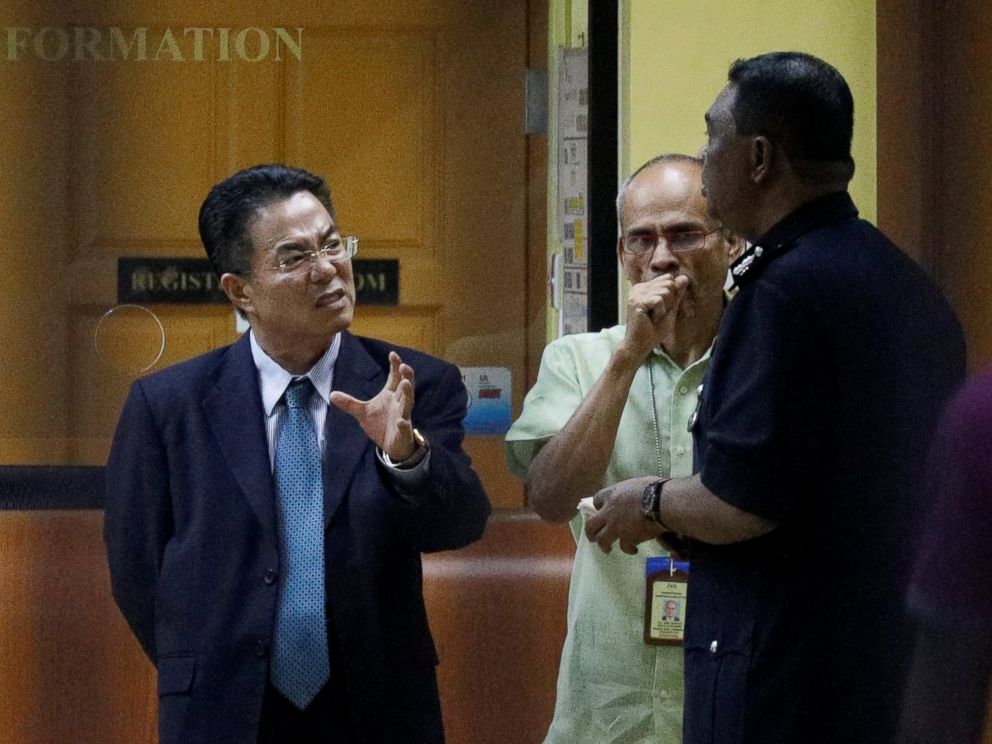
Feb. 14
Two senior Malaysian government officials, who spoke on condition of anonymity because the case involves sensitive diplomacy, told The Associated Press on Feb. 14 that the victim was Kim Jong Nam, the estranged older half-brother of North Korea’s leader who had been living overseas for years.
The Malaysian officials said Kim Jong Nam was targeted in the Kuala Lumpur International Airport’s shopping area before he went through immigration for his flight to Macau, where he is believed to have been living in recent years. They said he told medical workers before he died that he had been attacked at the airport with a chemical spray, the AP reported.
The U.S. State Department told ABC News on Feb. 14 that it was aware of the reports about Kim Jong Nam’s alleged assassination and referred questions to Malaysian authorities. The South Korean embassy in Washington, D.C., said it did not have independent confirmation of the reports but was monitoring media coverage.
Feb. 15
On Feb. 15, Malaysian authorities investigating the death arrested a woman carrying Vietnamese travel documents at Kuala Lumpur International Airport, where Kim Jong Nam was allegedly attacked. The suspect was alone at the time of the arrest and she was identified using surveillance footage from the airport, according to a statement from the Royal Malaysia Police.
The woman’s travel documents said her name was Doan Thi Huong and was born in May 1998, police said. It’s unclear whether the documents were genuine.
The South Korean Unification Ministry said on Feb. 15 it recognized that the North Korean man who died in Malaysia’s capital was “certainly Kim Jong Nam.” The ministry did not offer further details on the alleged murder.
"The government is certainly judging that the murdered person is certainly Kim Jong Nam,” the ministry’s spokesman, Jeong Joon-hee, said in Korean at a press briefing in Seoul. “The Malaysian government did not specify [that the murdered man is Kim Jong Nam]. Since this case is still being investigated, we should wait for details until the Malaysian government makes an announcement [on details of the murder]. I will only say that the South Korean government will closely cooperate with the Malaysian government."
South Korea’s spy agency, the National Intelligence Service, told the AP on Feb. 15 that North Korea had been trying for five years to kill Kim Jong Nam, and that he had sent a letter to Kim Jong Un in April 2012, begging for the lives of himself and his family.
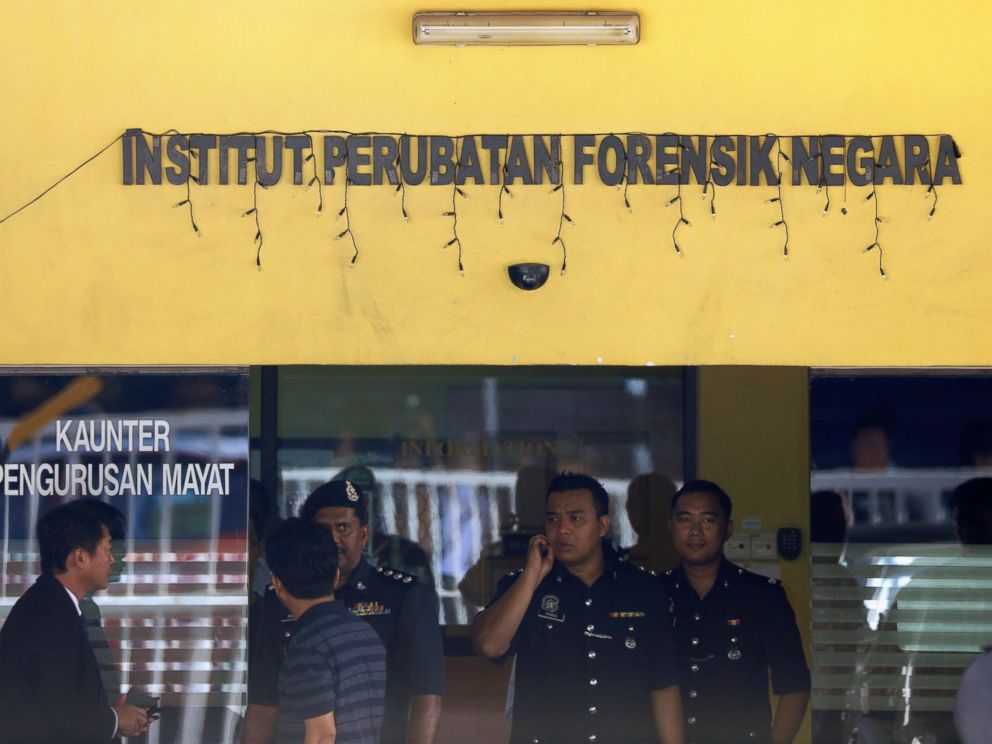
Feb. 16
On the morning of Feb. 16, Malaysian authorities arrested another woman believed to be involved in the death. The suspect was alone at the time of the arrest and she was carrying an Indonesian passport bearing the name Siti Aishah with a birth date of February 1992 and birthplace of Serang, Indonesia. She was also identified using surveillance footage from the airport, according to a statement from the Royal Malaysia Police.
Malaysian authorities announced a third arrest in the case later that day. The Royal Malaysia Police said in a statement that a Malaysian man, identified as 26-year-old Muhammad Farid Bin Jalaluddin, was arrested to “assist in investigations.” Police believe the man is the boyfriend of the suspect carrying an Indonesian passport.
Malaysian medical workers also completed an autopsy on the victim on Feb. 16 but the results were not yet released, the AP reported.
Feb. 17
Malaysian authorities on Feb. 17 said officials were not yet willing to hand over the body to North Korea and requested DNA samples from Kim Jong Nam's family as part of the post-mortem. Police said no one thus far has come forward to claim the body or provide DNA samples.
"If there is no claim by next-of-kin and upon exhausting all avenues [to obtain DNA], we will finally then hand over the body to the [North Korean] embassy," Abdul Samah Mat, a senior Malaysian police official, told reporters, though he wouldn’t say how long that process might take.
During a news conference outside the morgue in Kuala Lumpur, North Korean Ambassador Kang Chol said his country will “categorically reject” the results of the autopsy, which he said was conducted by Malaysia “unilaterally and excluding our attendance.”
Kang said the fact that Malaysia has yet to hand over the body of the North Korean national "strongly suggests that the Malaysian side is trying to conceal something which needs more time and deceive us, and that they are colluding with the hostile forces towards us who are desperate to harm us."
A senior Malaysian official, who spoke on condition of anonymity because he wasn’t authorized to speak to the media, told the AP on Feb. 17 that a second autopsy will be conducted the following day, after the result of the first autopsy was inconclusive.
Malaysian police later announced the arrest of a fourth suspect, a North Korean man identified as 46-year-old Ri Jong Chol. He was arrested on the night of Feb. 17 in Selangor near Kuala Lumpur, according to a statement from the Royal Malaysia Police, which didn’t provide further details.
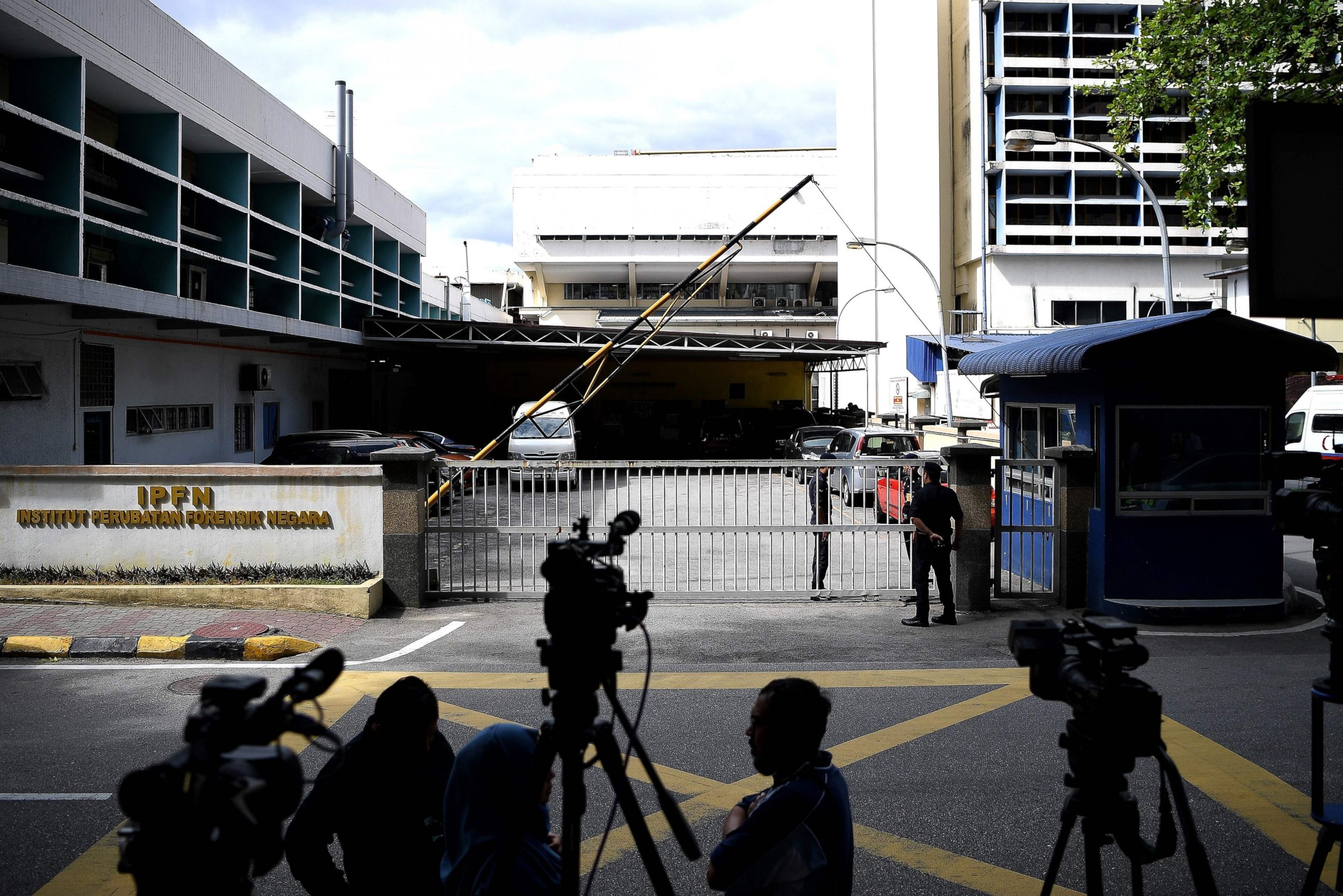
Feb. 20
The Malaysian foreign ministry announced in a Feb. 20 statement that it had recalled its ambassador to North Korea “for consultations” and had summoned Kang Chol, North Korea’s ambassador to Malaysia, “to seek an explanation on the accusations he made against the government of Malaysia.” The ministry called Kang’s comments “baseless,” adding that it “takes very seriously any unfounded attempt to tarnish its reputation.”
Kang responded by denouncing Malaysia’s investigation into the death, calling it politically motivated and demanding a joint probe.
Japanese television network Fuji TV released surveillance video, which it says it obtained from the Kuala Lumpur International Airport, purporting to show the alleged attack on Feb. 13. The footage is grainy, and parts of it are difficult to discern, but it appears to show one of two women grabbing a man who appears to be Kim Jong Nam from behind and putting him in what looks like a chokehold.
The apparent attack lasts only a few seconds in the footage. The man who appears to be Kim Jong Nam can later be seen seeking assistance from airport employees.
Feb. 22
Royal Malaysia Police Inspector-General Khalid Abu Bakar told reporters on Feb. 22 that the women suspected of carrying out the attack were trained to coat their hands with toxic chemicals then wipe them on the victims’ face. Khalid said North Koreans gave the deadly toxin to the two women -- one Indonesian and the other Vietnamese -- who he said had practiced the attack multiple times.
"We strongly believe it is a planned thing and that they have been trained to do that. This is not just like shooting a movie," the police chief told reporters.
Khalid couldn't say whether North Korea’s regime was behind the Feb. 13 death but added, "What is clear is that those involved are North Koreans."
The North Korean suspected of giving the poison to the women has been arrested and Malaysian authorities are seeking seven others, the police chief said.
Four of the North Korean suspects are believed to have fled the same day of the alleged attack and are now back in their home country. Malaysian officials have asked North Korea to track down the suspects and return them to Kuala Lumpur, Khalid said.
Three of the North Koreans suspected of involvement are believed to be at large in Malaysia, including the second secretary of the North Korean embassy, the police chief said.
A statement released on Feb. 22 by North Korea’s embassy in Kuala Lumpur called for the immediate release of the two “innocent women” arrested in connection with the death. The statement also rejected Malaysian police’s account of the alleged attack, saying if the poison was on the women’s hands “then how is it possible that these female suspects could still be alive?”
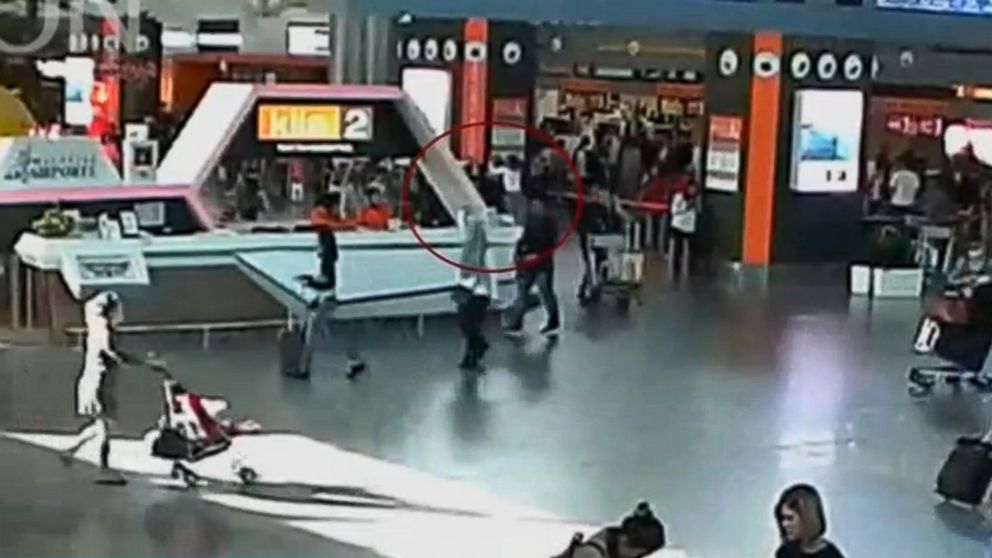
Feb. 23
The Korean Jurists Committee, a legal body affiliated with North Korea’s parliament, said in a Feb. 32 statement that Malaysia’s death investigation is full of “holes and contradictions” and was influenced by the South Korean government.
Feb. 24
The Royal Malaysia Police announced in a Feb. 24 statement that a preliminary analysis found VX nerve agent on the eyes and face of the victim.
VX is a man-made chemical warfare agent that’s classified as a nerve agent, the most toxic and quick-acting of the known chemical warfare agents, according to the U.S. Centers for Disease Control and Prevention. The oily, odorless, tasteless liquid is banned under the Chemical Weapons Convention, an international treaty that North Korea never signed.
The Organization for the Prohibition for Chemical Weapons, tasked with implementing the Chemical Weapons Convention, expressed its outrage in a statement obtained by ABC News on Feb. 24, saying “any use of chemical weapons is deeply disturbing.”
The U.S. State Department also said in a statement obtained by ABC News that “the United States is deeply concerned by any use of chemicals in attacks, which is an egregious violation of the tenets of the Chemical Weapons Convention.”
Malaysian police said the Kuala International Airport will be decontaminated, 11 days after the attack with the nerve agent allegedly took place. Police told reporters that one of the two women accused of wiping the toxin on the victim’s face was later sickened and was vomiting. It’s unclear which of the women had gotten sick.
Malaysia Airports later insisted in a statement that Kuala Lumpur International Airport was safe, though no decontamination had taken place, and there have been “no anomalies on the medical cases” since the Feb. 13 attack. It said the customer service workers who attended to the victim and the facility’s cleaning staff are in good health.

Feb. 25
Malaysian police confirmed to the AP on Feb. 25 that they had raided a condominium earlier that week as part of the death investigation. Senior police official Abdul Samah Mat, who is handling the probe, did not specify what items authorities found there but said they were awaiting lab results testing for traces of any chemicals.
The two women -- one Indonesian and one Vietnamese -- accused of carrying out the Feb. 13 attack met with representatives from their country’s respective embassies in Malaysia on Feb. 25.
Indonesia’s deputy ambassador Andriano Erwin told reporters the Indonesian woman, Siti Aishah, said she had been paid the equivalent of $90 for what she believed was a harmless prank for a reality TV show. Vietnam’s foreign ministry said the Vietnamese woman, Doan Thi Huong, also thought she was taking part in a prank.
Feb. 26
After conducting a two-hour sweep, Malaysian police on Feb. 26 declared the terminal at the Kuala Lumpur International Airport a “safe zone.” They said they found no hazardous material nor trace of the nerve agent that was allegedly used in the Feb. 13 attack.
Malaysian Health Minister Subramaniam Sathasivam said later that autopsy results suggest the nerve agent caused “very serious paralysis” that ultimately led to the victim’s death “in a very short period of time.” Subramaniam said the dose of poison was so high that it killed the man “within 15-20 minutes.”
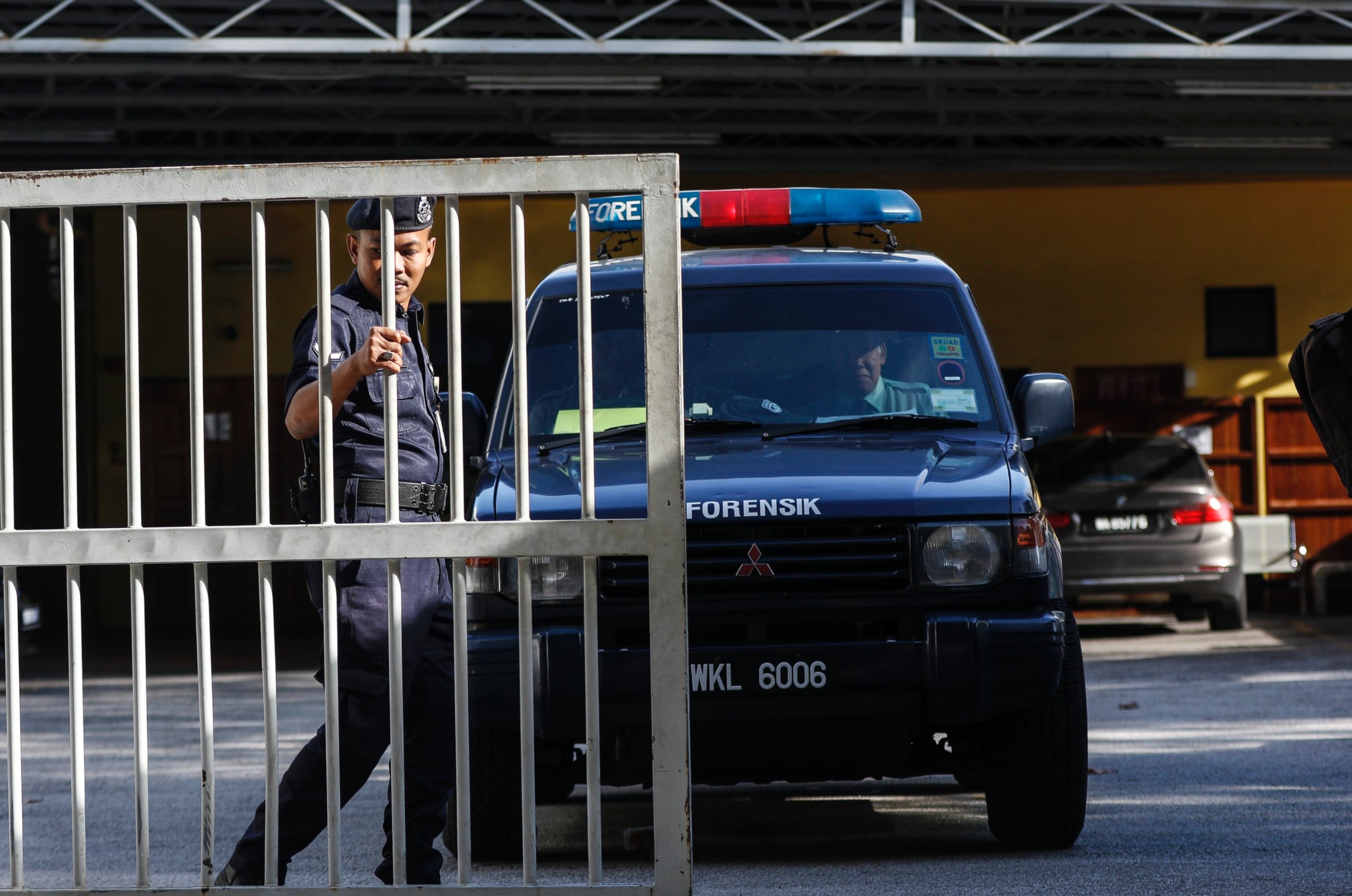
Feb. 27
South Korean lawmakers said in an interview with the AP that the country’s National Intelligence Service told them on Feb. 27 that four of the North Koreans identified as suspects by Malaysian authorities are spies from North Korea’s Ministry of State Security.
The lawmakers cited the National Intelligence Service as also telling them that two other suspects are affiliated with North Korea’s Foreign Ministry and leader Kim Jong Un directed a “state-organized terror” to kill his half-brother, according to the AP.
Lawmakers didn't say how South Korea’s spy agency got the information. The National Intelligence Service has a spotty record on reporting developments in isolated North Korea. The agency told the AP it cannot confirm its reported assessment on Kim Jong Nam's death.
Feb. 28
A high-level delegation of North Korean officials arrived in Malaysia’s capital. Ri Tong Il, the former North Korean deputy ambassador to the United Nations, who was part of the delegation, told reporters outside North Korea’s embassy in Kuala Lumpur that the diplomats wanted to obtain the victim’s body and seek the release of a North Korean arrested in connection to the case.
Ri also said he hoped to encourage “the development of friendly relations” between the two countries.
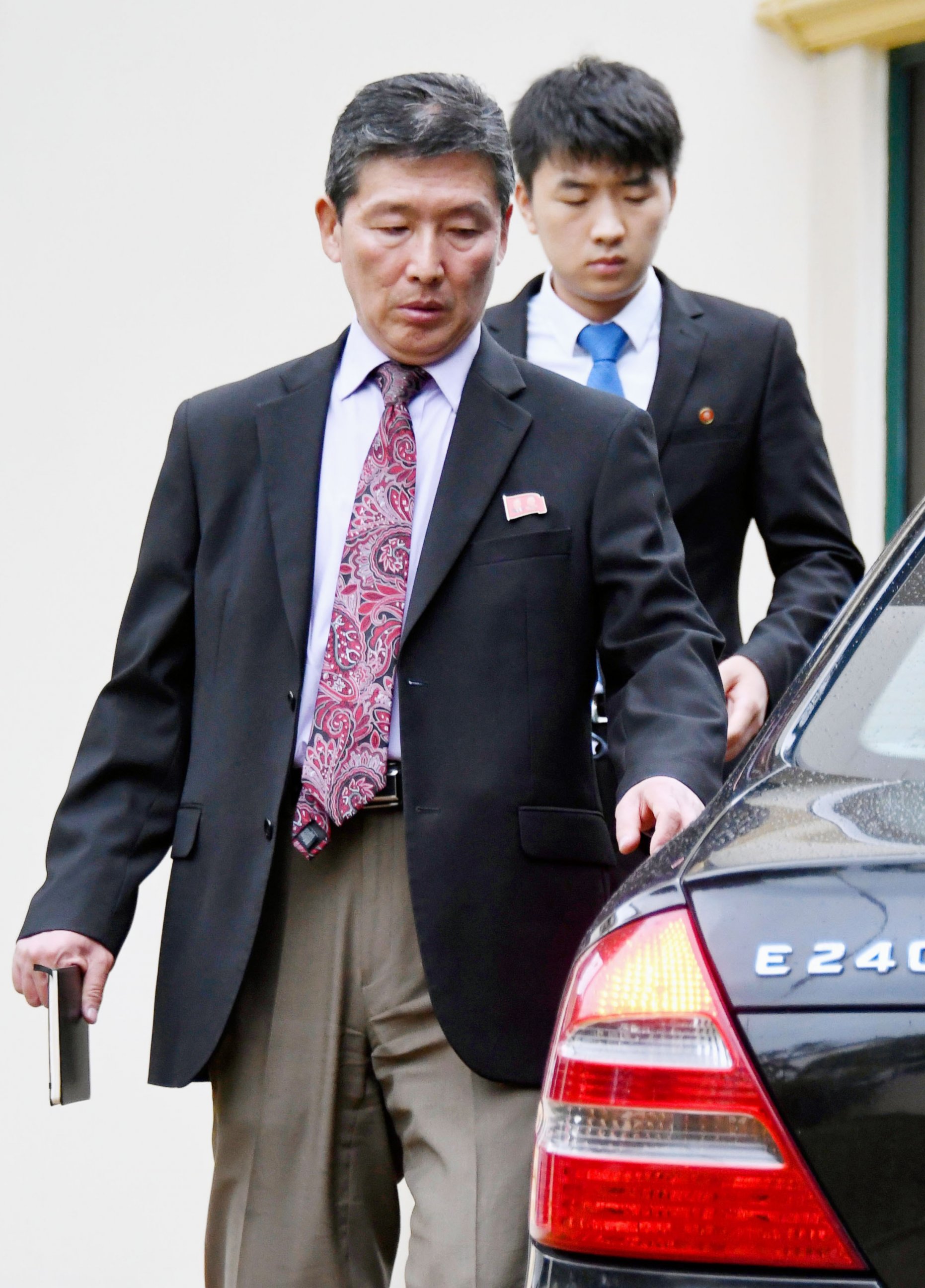
March 1
The two women accused of smearing the nerve agent on the North Korean national were officially charged with murder on March 1, after arriving in court under the protection of masked special forces.
Neither woman entered a plea because the magistrate court where they appeared has no jurisdiction over a murder case. Lead prosecutor Iskander Ahmad told the court he will request for the case to be transferred to a higher court and for the two women to be tried together, according to the AP.
Each woman faces a mandatory death sentence if convicted.
Malaysian Health Minister Subramaniam Sathasivam said authorities have still not received DNA samples from Kim Jong Nam’s family.
"We don't have the specimen,” Subramaniam told reporters on March 1. “We have a body of one person who has got a North Korean passport with the name of Kim Chol. The whole world says this is Kim Jong Nam. So for us to say this is not Kim Chol but this is Kim Jong Nam we must need evidence and that evidence can only be got by the DNA profiling of the relatives and others, so that is the reasoning."
March 2
Ri Tong Il, the former North Korean deputy ambassador to the United Nations, said a heart attack likely killed the victim, not VX nerve agent as the autopsy showed.
Malaysian Attorney General Mohamad Apandi Ali announced on March 2 that Ri Jong Chol, one of the North Korean suspects, will be released later in the week and deported due to a lack of evidence connecting him to the Feb. 13 attack.
Malaysia’s state news agency reported on March 2 that the country is ending visa-free travel for North Koreans this week, citing security reasons. Under a reciprocal deal, North Koreans can currently visit Malaysia for up to 30 days without having to secure a visa.
ABC News’ Joohee Cho, Conor Finnegan, Benjamin Gittleson, Matt Gutman, Michael Edison Hayden, Joshua Hoyos, Maureen Jeyasooriar, Luis Martinez and Joseph Simonetti contributed to this report. The Associated Press also contributed to this report.



